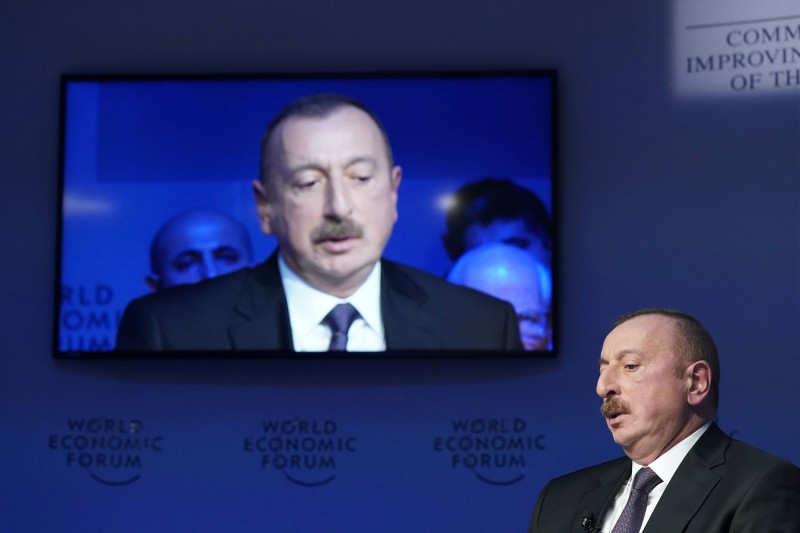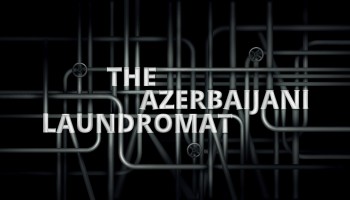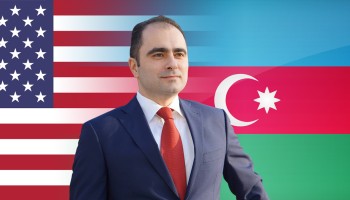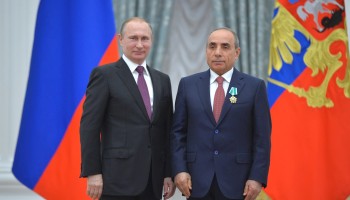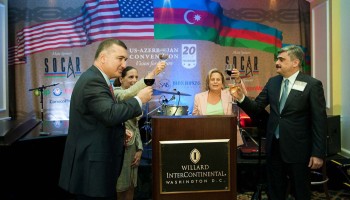Some of the money that passed through the Azerbaijani Laundromat, a secret money laundering scheme and slush fund that saw €2.5 billion (US$ 2.9 billion) flow out of the country between 2012 and 2014, ended up in the hands of a purportedly private Azerbaijani organization that hired a Virginia firm to lobby the US government for more than a decade.
The Organized Crime and Corruption Reporting Project (OCCRP) has earlier reported that other monies from the fund were used to advance the Azerbaijani government’s political agenda, with some ending up in bank accounts belonging to European politicians who spoke highly of President Ilham Aliyev’s regime even as it arrested journalists and political activists. The precise origins of the funds are unknown, hidden behind secretive shell companies. But there is ample evidence that the authoritarian country’s ruling elite is behind them.
Now, a new investigation shows how a series of transfers from two shell companies at the heart of the Laundromat – which have no real owners or directors – funneled over a million and a half dollars to a mysterious Baku-based organization called Renaissance Associates. This group, in turn, engaged a US lobbying firm to orchestrate praise for Azerbaijan and had its representatives make thousands of dollars in campaign donations, including to Senators and Representatives who sat on committees that determine foreign aid budgets.
At the core of both the European and US lobbying efforts is the same man – Elkhan Suleymanov, an Azerbaijani parliamentarian who Italian prosecutors say is responsible for implementing an aggressive plan to improve the country’s image called “Azerbaijan 2020: Smile Future,” initiated in late 2011 by President Ilham Aliyev.
Suleymanov runs a pro-regime organization in Baku which appears to work hand-in-hand with Renaissance, even using the same office space. But since there is no formal connection between Renaissance and Suleymanov, or anyone else in the Azerbaijani government, the scheme allows the US lobbying firm it employs to avoid disclosing the relationship under the Foreign Agents Registration Act (FARA), as those representing the interests of foreign governments are required to do.
Other payments were made to an influential oil and gas consultant with close ties to President Aliyev who presents himself as an immigration success story and lives in Dayton Ohio — even as he also lobbies the US government on his homeland’s behalf. (See: Baku’s Man in America)
An Azerbaijani Renaissance
According to records from the Azerbaijani Laundromat, two offshore shell companies at the heart of the scheme — Metastar Invest and Hilux Services — made 18 payments totaling US$ 1,655,649 to Renaissance Associates S.A between September 2012 and December 2014.
Renaissance is allegedly a “consortium of businessmen, educators and investors” based in Baku, Azerbaijan with offices in Zug, Switzerland. Its purported goal is to help “promote [Azerbaijan’s] image in the United States by publicizing its continuing commitment to democratic principles and a more civil society since its independence in 1991.”
But further details about the organization are scant. It has no website and no contact information, and its “consortium” has no publicly disclosed membership. For the past 14 years, its only apparent activity has been its relationship with Bob Lawrence & Associates (BL&A), a lobbying firm in Alexandria, Virginia.
Renaissance is BL&A’s sole international client. Quarterly lobbying reports filed by the firm show that, between July 2012 and December 2015, its income from Renaissance totalled $1,533,000 — close to the amount that Renaissance itself received from the Laundromat around this time, according to available data.
Furthermore, the final four of the Laundromat payments to Renaissance match closely with the sums the group spent on BL&A lobbying in four of the five subsequent quarters (see infographic).
Since first registering as a lobbyist for Renaissance in March 2004, BL&A has worked steadily on issues of interest to the Azerbaijan government. In 2006, the firm reportedly handled the logistics of President Aliyev’s visit to the White House. Three years later, it arranged for Obama’s former campaign manager, David Plouffe, to visit Baku and speak to members of the Azerbaijani government.
According to its lobbying reports, BL&A’s specific lobbying issues have included US defense appropriations in the region; the territory of Nagorno-Karabakh, which is disputed between Azerbaijan and Armenia; and a critical oil pipeline from Azerbaijan to Turkey that lies nearby.
Between 2008 and 2016, BL&A’s president Bob Lawrence was annually invited to recommend foreign aid budgets to Azerbaijan and Armenia before the House Appropriations Subcommittee on State, Foreign Operations and Related Matters.
His testimonies frequently emphasized Azerbaijan’s oil and gas resources and infrastructure as “critical to the security and wellbeing of the people of Europe” and have repeatedly called for the elimination of Section 907 of the Freedom Support Act, which bans direct US aid to the Azerbaijani government.
He also informed the subcommittee that Armenia, Azerbaijan’s regional rival, is a “rogue nation […] clearly protecting criminals” and that it commits human rights violations. He is much more forgiving of Azerbaijan. Though admitting in his first testimony that “8 or 9 journalists have been beaten or jailed,” he asserts that “President Aliyev pardoned most of these.”
Lobbying for Lobbyists
Lobbying disclosure reports also show that BL&A’s collaboration with Renaissance included subcontracting other US lobbying firms on its behalf. For example, between July 2012 and December 2015, BL&A paid at least $250,000 to the Crane Group to lobby the US Senate and House of Representatives on “state and foreign relations” and to provide “assistance to Azerbaijan.”
Over the same period, BL&A spent $280,000 contracting former Congressman Solomon Ortiz (D-TX) through his firm, Solomon P Ortiz Holdings LLC, to lobby on “strategic relations” between the US and Azerbaijan. Six weeks after this work began in 2012, he wrote a glowing blog post on Azerbaijan in the Huffington Post. Ortiz also has a long history of promoting Azerbaijan’s interests in Capitol Hill. In 2004 he co-founded the Congressional Azerbaijan Caucus, a group of legislators coordinated by Laundromat recipient Baguirov (See: Baku’s Man in America).
One of Ortiz’s long-time advisors, John McGregor, was also involved in the caucus’s development. McGregor joined BL&A as a consultant in 2005 and lobbied the US government on behalf of Renaissance as recently as 2016 through his own company, the McGregor Group.
Between 2012 and 2015, individuals registered as lobbyists acting directly or indirectly on behalf of Renaissance made thousands of dollars in donations to political candidates, including to Senators and Representatives who were sitting on, or chaired, appropriations subcommittees at the time.
“Not involved in that stuff”
The Foreign Agents Registration Act (FARA) is a US Department of Justice statute which requires lobbyists representing foreign government to register as such, and to provide some basic information about their work.
On its website, BL&A states that it “does not work for, report to, or take directions from the Azerbaijani government or any member of the Azerbaijani government.”
But in 2005 — a year after BL&A first began working with Renaissance — Azerbaijan’s independent Turan News Agency reported that it had received a letter identifying Renaissance as a lobbying firm representing the Azerbaijan government in Washington.
Despite its close collaboration with Renaissance — itself funded by the Azerbaijani Laundromat — BL&A has never registered its work for the organization under FARA.
This is because Renaissance is not technically a government entity, which allows BL&A to avoid disclosing any information about who controls or funds its client. By purporting to be a private sector group interested in trade, BL&A is only subject to the less stringent Lobbying Disclosure Act (LDA).
“The LDA exception swallows the FARA registration rule in many situations,” says Gabriel Gillett, a lawyer at Jenner & Block, “but the number of layers between a foreign government and the activity in the US doesn’t necessarily absolve someone of needing to register under FARA.”
“Image building or public relations services in the United States, which are non-commercial political activities aimed at influencing the US public ... does trigger FARA,” says Josh Rosenstein, a lawyer at Sandler Reiff who specializes in FARA. “FARA’s applicability is much more broad than just traditional lobbying. It specifically includes, as listed in the statute, public relations and communications work.”
Contacted by reporters about his firm’s work for Renaissance, Bob Lawrence, its founder and president, said that he had not been “involved in that stuff” for three years. Yet the firm submitted lobbying reports for the work as recently as July 2017 and still lists Renaissance as a client on its website. Lawrence declined to comment further about Renaissance or the firm’s lack of FARA registration.
BL&A’s senior vice president, James Goldwater, denied ever having Renaissance on his personal portfolio.
Lobbying reports filed by the firm, however, state that he personally lobbied on behalf of Renaissance on a range of issues between 2004 and 2009, including the pipeline to Turkey and defense appropriations for the Caucasus. When asked if that meant the firm had provided false information to the US government, Goldwater only reiterated that he had never worked on these issues.
Similarly, McGregor told reporters that he had “no interaction with Renaissance” and was given directions directly from Bob Lawrence. But according to BL&A’s website, McGregor was “principally involved in the firm’s collaboration with Renaissance.” He did not explain why his work for the organization had not been registered under FARA.
Supporting and Nurturing
As part of its collaboration with Renaissance, BL&A states on its website that it works “on a daily basis” with the Association for Civil Society Development in Azerbaijan (ACSDA).
Based in Baku, ACSDA is a pro-regime non-profit organization controlled by Elkhan Suleymanov, a member of Azerbaijan’s parliament and former member of the Parliamentary Assembly of the Council of Europe (PACE).
According to BL&A’s website, Renaissance “supports and nurtures” ACSDA. But the relationship appears to be much closer than that; the two organizations even share the same Baku apartment. And when, in April 2016, ASCDA signed a three-month contract with US lobbying firm Greenberg Traurig, the firm’s FARA filing shows that the $25,000 per month fees had been paid by Renaissance.
Furthermore, a former German politician, Eduard Lintner, who received payments from the Azerbaijani Laundromat and subsequently praised the country’s universally-panned elections as fair, described ACSDA as the source of his payments. Some of the transfers were made from the same shell company that had funneled money into Renaissance.
(The scandal was part of a separate Azerbaijani lobbying effort led by Suleymanov in Europe, and previously reported by OCCRP, which also involved two other PACE members who also received payments from the shell company.)
When OCCRP reporters called Suleymanov’s office, his secretary told them that they could not speak to him directly as he does not speak English. His profile on the Council of Europe website, however, lists English as his working language. Neither Suleymanov nor his office responded to questions about Renaissance.
“If the NGO, that is itself controlled by the government, is actually controlling, giving direction or funding to this opaque company [Renaissance], then it would seem that FARA would likely be required,” says Rosenstein, the Sandler Reiff lawyer. “This middle-man is essentially a shell being used to either intentionally avoid FARA registration, or otherwise to pass the funds through to the US actor.”
“I think you’ve got several issues here that at the very least raise the real specter of FARA requirements which are not being followed,” says Rosenstein.
Lending Electoral Legitimacy
In his 2013 testimony to the House Appropriations Subcommittee, BL&A’s Lawrence questioned the veracity of Armenia’s presidential election results that year by reading out a press release quoting Suleymanov. In almost a decade of testifying on behalf of a company that publicizes Azerbaijan’s “continuing commitment to democratic principles,” he has remained silent on the country’s own elections.
International observers, including the US Department of State, noted intimidation of the opposition and independent media during the country’s presidential election that October. In one embarrassing gaffe, Azerbaijan’s election commission accidentally released a set of results on its official smartphone app before the vote was even held. A subsequent report released by Freedom House, a human rights and democracy watchdog, described President Aliyev’s landslide reelection as “predictable” and noted “significant evidence of massive electoral fraud.”
As previously reported by OCCRP, two PACE members who received money from the Laundromat took part in official monitoring delegations to Azerbaijan and subsequently praised the elections.
In the US, Renaissance was orchestrating a similar scheme.
In an op-ed in the Hill, former Congressman Michael McMahon (D-NY) described the 2013 elections as “fair, well-organized and transparent.” He had taken part in a team set up and coordinated by BL&A on behalf of Renaissance called the American Observers Group. The group, which has included BL&A employees, ex-Congressmen, prominent political analysts, and attorneys, has consistently praised Azerbaijan’s presidential elections.
This was McMahon’s second trip to Azerbaijan that year. In May, he had attended a controversial conference in Baku organized by Baguirov, another recipient of Laundromat funds, and secretly funded by Azerbaijan’s state oil company. While in office, McMahon had also received several campaign donations from BL&A staff.
McMahon did not respond to requests for comment, but reporters were able to track down some of the delegation’s former members.
“It was a very distinguished delegation,” said former Congressman Sherwood Boehlert (R-NY), who had been invited by Lawrence to join the group in 2008. “Several people [in the group] I knew by reputation, including [TV journalist] Lawrence O’Donnell.”
Two other members of the group’s 2008 trip were Cathy Travis, who had retired from Capitol Hill as Congressman Ortiz’s senior advisor earlier that year, and lobbyist Mark Veith, who took part while subcontracted by BL&A to lobby on behalf of Renaissance. All three told reporters that they saw no irregularities, but emphasized that it was a very fast trip focusing only on the events at, as Travis described, “the most basic level.”
Boehlert added that all the expenses for the trip were paid for by BL&A.
Congressman Ortiz joined the delegation in 2013, at the same time as he was lobbying on strategic US-Azerbaijan relations. He told Azerbaijani media that the elections had been “free, fair and transparent.” Accompanying him in 2015 was his Congressional Azerbaijan Caucus co-founder, Curt Weldon (R-PA). Neither former Congressmen responded to repeated requests for comment.
Renaissance may have been inspired to create its own monitoring group after its previous experience hiring two seasoned US survey research firms for Azerbaijan’s 2005 president elections. Warren Mitofsky and Joe Lenski, the two firms’ presidents, later wrote about how Renaissance had advised them to hire ACSDA to conduct the exit polls, but then pressured them to withhold publication of their results, claiming it could lead to civil unrest.
Lenski told OCCRP reporters that it was Lawrence who had first contacted them on behalf of Renaissance. After they published their results anyway, he said that Suleymanov – who had invited them to his home during the trip – contacted them to express his displeasure.
“I don’t think I’m welcome in Azerbaijan anymore,” he said.
This April, after calling a snap election that several opposition parties boycotted, President Aliyev secured a fourth term. International observers reported widespread disregard for mandatory procedures and numerous serious irregularities.
Additional reporting and research by Atanas Tchobarov, Khadija Ismayilova, Lejla Sarcevic, and Paul Radu.
